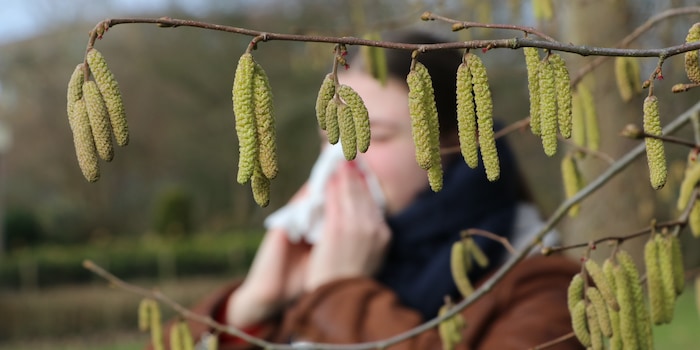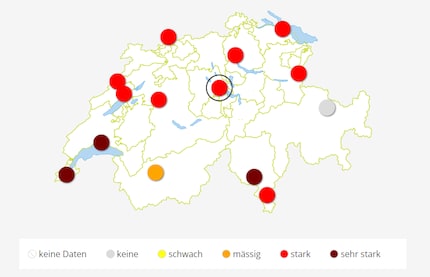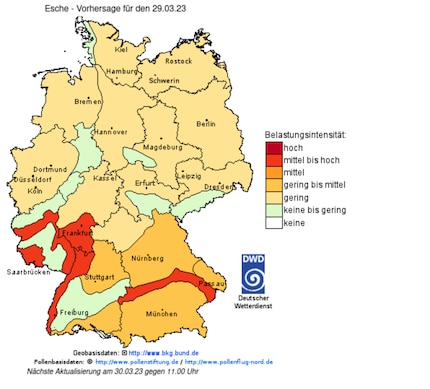
Guide
Nasal irrigation: this is how the Ayurvedic technique works
by Olivia Leimpeters-Leth

Covid mask, nasal douche and black cumin oil – what else helps against the annoying pollen allergy? Here are some tips.
Hay fever is actually a big misunderstanding in your body. Your immune system reacts to harmless pollen from trees, bushes or grasses as if they were dangerous invaders and produces antibodies and histamines that cause the typical symptoms. These range from itchy eyes and a sniffly nose to shortness of breath and asthma. For about 15 to 20 per cent of the population, the beginning of spring also means the start of a new hay fever season. Depending on the region and type of pollen, it can last from April all the way into summer.
If you want to know exactly when the pollen load is particularly high, Switzerland’s allergy centre provides data for hazel, alder, ash, birch, beech, oak and grasses on its website (available in German and French).

In Germany, for example, Germany’s National Meteorological Service, the Deutscher Wetterdienst (DWD), provides data on pollen. Click here to see the pollen levels on a daily basis (only available in German). The website offers data on birch, hazel, ash, alder, grasses, rye, mugwort and ragweed.

Try to keep your contact with pollen to the absolute minimum. This means, for example, ventilating your flat only briefly and keeping windows and doors shut as much as possible during the high season. Wearing sunglasses and a mask can also help keep pollen out. You can even reuse your DIY fabric masks from the early phase of the pandemic. That said, medical or FFP2 masks offer better protection.
Nasal irrigation with a salt-water solution can help flush pollen out of the nose, relieving symptoms. To do this, you can simply cup some sea salt or saline solution into your hands and pull it up through your nose. To make things even easier, use a nasal irrigation kit.
Herbal remedies can also provide relief from hay fever symptoms. These include, for example, the common butterbur (Petasites hybridus), ivy (Hedera helix), turmeric (Curcuma longa), nettle (Urtica) and black cumin (Nigella). Butterbur and ivy can dilate the airways, making it easier to breathe. Turmeric and black cumin oil have anti-inflammatory properties, and nettle can help with allergic reactions. These herbal extracts are usually available as drops or capsules.
However, it’s important to consult a physician before using herbal remedies to ensure that they’re appropriate for your individual needs and won’t interact with other medications.
If your symptoms don’t calm down despite all your efforts, you should definitely see a doctor. They may prescribe targeted therapies, such as antihistamines or immunotherapy, to relieve or, in the best case, eliminate your symptoms altogether.
Antihistamines are medications used to relieve symptoms of hay fever, as well as other allergic conditions. They block the effect of histamine, which is released in your body during an allergic reaction and is responsible for typical symptoms such as itching, rhinitis and skin rash. Antihistamines come in various forms, including tablets, nasal sprays and eye drops. Older generations of antihistamines, such as diphenhydramine or chlorpheniramine, have a disadvantage: they can affect the central nervous system and cause fatigue, drowsiness and impaired concentration. In contrast, modern antihistamines (e.g. loratadine and cetirizine) are more selective and attack only the histamine receptors of the target organs, causing fewer side effects.
Immunotherapy, also called hyposensitisation, consists of regular injections (subcutaneous) or drops (sublingual) containing tiny amounts of the allergen you’re allergic to. The goal is to gradually acclimate your immune system to the allergen and build up tolerance. Immunotherapy is usually a long-term process that can take several years. In return, there’s a chance that immunotherapy will provide lasting relief or even cure your allergy.
What helps you best against hay fever?
The competition has ended.
Got any other tips for combating hay fever? Drop them in the comments!
Header image: Shutterstock
Science editor and biologist. I love animals and am fascinated by plants, their abilities and everything you can do with them. That's why my favourite place is always the outdoors - somewhere in nature, preferably in my wild garden.
Practical solutions for everyday problems with technology, household hacks and much more.
Show all